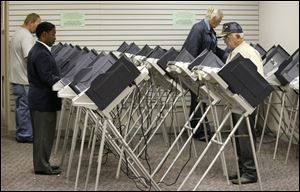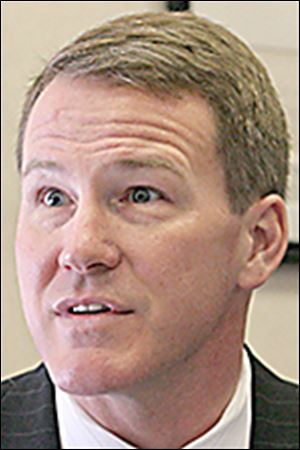
COMMENTARY
Ohio’s elections better; Lucas County still has problems
Online registration would save money, encourage more Ohioans to vote, and reduce lines at the polls
4/13/2014
Kushma

Voters in Toledo cast ballots at an early-voting site operated by the Lucas County Board of Elections.
Good news: Ohio has greatly improved the way it runs its elections, a new national study says.
Bad news: The bumbling Lucas County Board of Elections and the vote-suppressing Ohio General Assembly continue to do their best — or worst — to erode that progress.
A report released last week by the Pew Charitable Trusts, a nonpartisan research and public policy group, evaluates how every state conducted the 2012 general election. Ohio, you’ll recall, was the focus of national attention two years ago as a swing state that likely would decide the presidential vote (we didn’t, since President Obama’s margin of victory over Mitt Romney was larger than many analysts predicted).
The Pew index ranks Ohio 24th among the states for its election performance in 2012 — mediocre, but still better than in 2010 (29th) and 2008 (37th). It calculates that Ohioans who went to polling places two years ago had to wait 11 minutes, on average, to vote — slightly less than the national average and down from almost 16 minutes in 2008.

Kushma
The study notes approvingly that even though Ohio mailed absentee-ballot applications to every registered voter in the state for the first time in 2012, the rate at which it rejected mail-in ballots declined from previous elections. A record one-third of Ohio voters cast their ballots before Election Day, through in-person early voting and “no excuse” voting by mail.

Husted
The state did better at handling provisional ballots — votes that are cast by people whose eligibility is questioned, and are not counted until the challenge is resolved — the study concludes. And Ohio got high marks for collecting and reporting timely data about how it ran the election.
“Ohio has the most expansive voting opportunities of any state in the country,” says Secretary of State Jon Husted, Ohio’s chief election official. “We bend over backwards to help voters cast their ballots.”
Many of the Pew study’s findings echo the proposals offered this year by a bipartisan White House commission on elections administration. The biggest deficiency the study identifies in Ohio’s election procedures is its failure to allow would-be voters to register online — something 17 states already do and four other states are preparing to do.
If Ohio had online registration, Mr. Husted told me last week, it would have finished among the top 10 states in the study. More important, online registration would save money, encourage more Ohioans to vote, and improve the accuracy of voter rolls, thus reducing lines at the polls and the need to rely on provisional ballots.
Yet despite Mr. Husted’s aggressive advocacy of online registration, his fellow Republicans in the legislature continue to ignore his pleas to authorize it. The secretary, who is seeking re-election this year, makes no secret of his frustration.
“We could start this service tomorrow if the General Assembly would give us the authority — that’s the shame of it,” says Mr. Husted, a former state House speaker. “The leadership won’t give me a good explanation. [Lawmakers] spend a lot of time on election matters that we don’t ask them to do, but they don’t spend any time on something like this that is in everybody’s best interest.”
Whatever overall progress the state has made on improving its elections, Lucas County remains a backwater. Mr. Husted says he has doubts about the local elections board’s ability to run the May 6 primary effectively.
Mr. Husted has sent a bipartisan “transparency committee” to Toledo to examine the activities of the perpetually dysfunctional and squabbling county board and its staff. Committee members have identified a shortage of poll workers for next month’s vote, along with other irregularities in basic board operations.
“These cultural problems, personality conflicts, policy problems, competence problems have persisted for years,” says Mr. Husted, who previously placed the county board under his direct oversight. “Taxpayer dollars are at risk, and [board members] have done almost nothing to resolve those issues.”
At the same time, he says: “The voters of Lucas County shouldn’t lose confidence in spite of these travails. We are sending people in to make sure the primary runs smoothly. I don’t want anything to go wrong — I want to get through this election, fix it, and move on.”
After next month’s election, Mr. Husted adds, he plans to “take swift action to make whatever changes we’re going to need to put in place for the November election.” Will these changes include replacing the four elections board members? “Everything’s on the table,” he says.
In Columbus, meanwhile, the Republican-controlled legislature resists measures that would boost voter turnout. Instead, they continue to pass bills that would make it harder to vote for people who are less likely to, well, vote Republican.
A new election “reform” law forbids any official other than the secretary of state from mailing unsolicited applications for absentee ballots — so much for local control. Last week, House members took things a step further, passing a measure that would have cut by 10 percent state aid to any county that had the temerity to send out applications.
The latter gesture was aimed at Cuyahoga County Executive Ed FitzGerald, this year’s all-but-certain Democratic nominee for governor, who has repeatedly battled the state over his efforts to provide ballot applications in his urban county. After Mr. FitzGerald demanded a federal investigation of the House measure, Gov. John Kasich counseled Republicans to back off. Lawmakers dropped the measure, but their message remains clear.
Mr. Husted, who has had his own skirmishes with Mr. FitzGerald over voting procedures, says: “There’s no reason for any county to act contrary to state law. We’re going to send every single registered voter an absentee ballot application. That’s going to work fine.”
He adds: “I hope everybody can just take a deep breath and calm down.”
That, at least, is good advice. And if officials in Lucas County and the Statehouse aren’t inclined to help improve the way Ohioans cast our votes, they need to get out of the way before they make things worse.
David Kushma is editor of The Blade.
Contact him at: dkushma@theblade.com or on Twitter @dkushma1